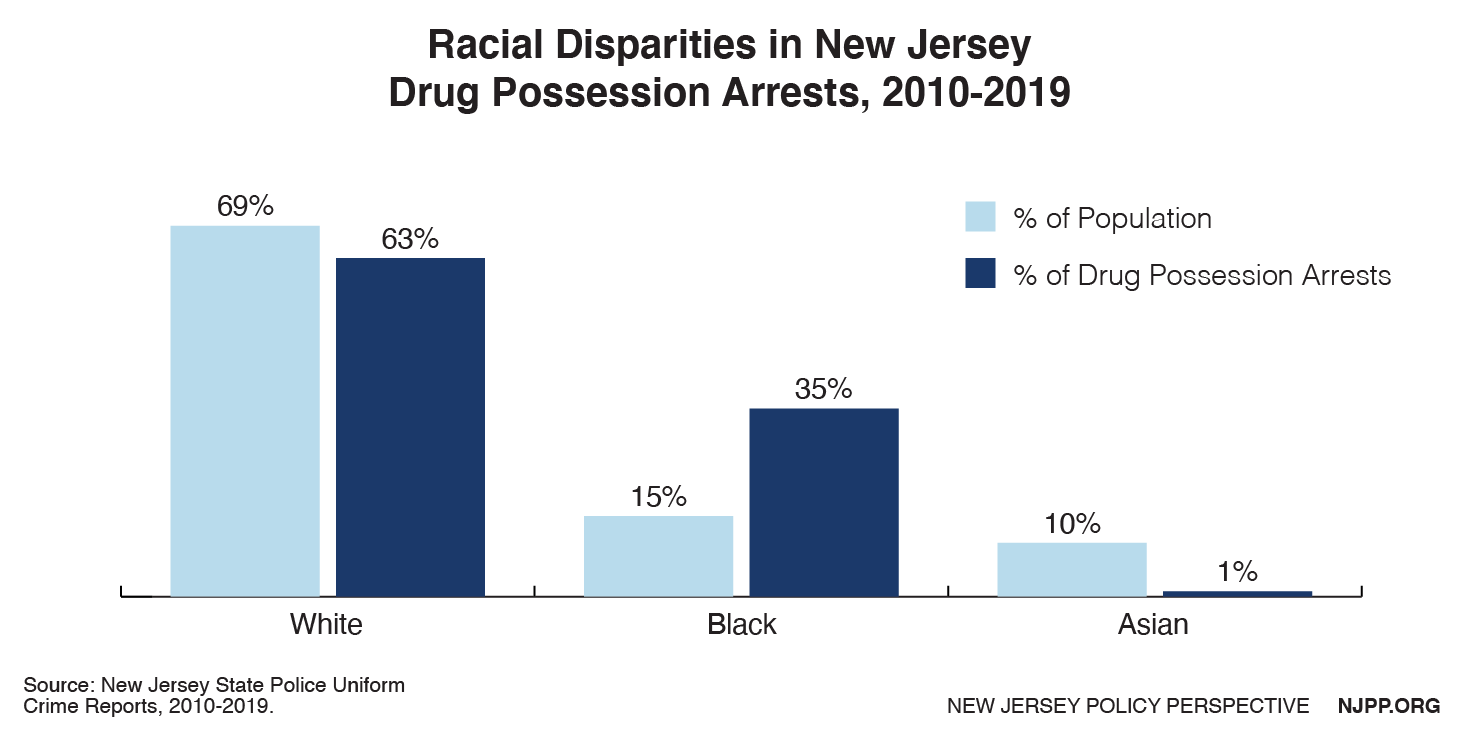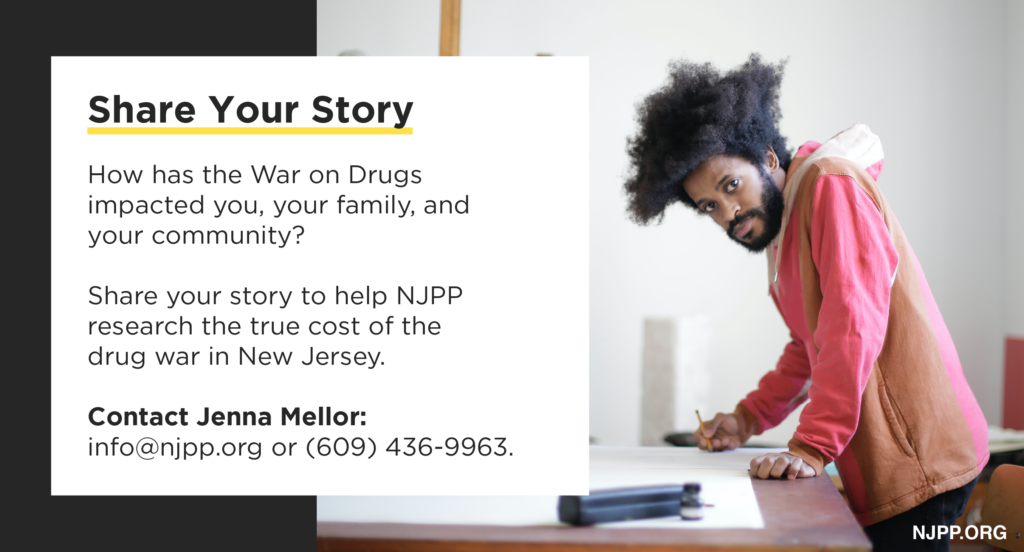NJPP is currently researching the true cost of the War on Drugs in New Jersey. If the drug war has directly harmed you, your family, or your community, please consider sharing your story with us. For more information, please email Jenna Mellor at info@njpp.org with the subject line “Drug War Story.” You may also call or text Jenna at (609) 436-9936.
The murders of George Floyd, Tony McDade, Breonna Taylor, and Elijah McClain, who join a long and growing list of Black people murdered by law enforcement officers, have catalyzed a widespread examination not only of the actions of law enforcement but also the role that budgets play in funding racist, ineffective, and deadly practices that target our Black neighbors, colleagues, and loved ones.
The relative media silence around the death of McDade, a Black trans man, along with the murders of Black trans women (four in the month of June alone) like Dominique “Rem’mie” Fells in Philadelphia and 17-year-old Brayla Stone in Arkansas, make even more urgent the need for investments in public safety to actually keep the public safe, especially for those most vulnerable to violence.
For far too long, states across the nation, including New Jersey, have prioritized ongoing investment in a failed War on Drugs at the expense of investments in our communities, from public education to reliable mass transit to a robust social safety net. In 2016 alone, New Jersey invested more than $670 million ($715 million in 2020 dollars) in state and local expenditure for arrests, trials, and incarceration for drug-related crimes.
This is a problem of serious moral and public policy consequence, which Kassandra Frederique of the Drug Policy Alliance powerfully captures (read her full statement here):
George Floyd should be alive today. Instead, he drew his last breath after one police officer knelt on his neck for nine minutes and another taunted ‘don’t do drugs, kids’ to the gathered crowd. With George Floyd most recently, Breonna Taylor earlier this month, and countless others before them, perceived drug possession and drug use served as a justification by law enforcement to dehumanize, strip dignity from, and ultimately kill people of color.
New Jersey’s drug war perpetuates racial disparities in drug arrests, convictions, and sentencing. It exacerbates discrimination against transgender and gender-expansive New Jerseyans, who report frequent harassment and harm by police. And, quite perversely, New Jersey’s drug war punishes people for their connection to substance use, which is widely considered to be an issue of public health and community healing, not law enforcement.
In New Jersey, eight out of ten people arrested for a drug-related crime in the past decade were arrested for having a small amount of drugs. People of all races and ethnicities use illicit substances at similar rates. So, in the absence of racial inequities, we would expect all New Jerseyans who use drugs to be arrested at similar rates as well. Yet, New Jersey State Police arrest data from 2010 through 2019 shows that Black New Jerseyans were 2.6 times more likely than white New Jerseyans to be arrested for their personal substance use.

At the same time, fatal overdose rates among Black New Jerseyans have been increasing faster than those of white New Jerseyans in recent years. Between January and June 2020, New Jersey has lost 20 percent more of our residents to fatal overdose than in the same period last year. New Jersey Policy Perspective is currently seeking fatal overdose data by race and ethnicity for 2019 and 2020. While we do not know how overdose death rates are changing for Black and Latinx New Jerseyans in these years, what we do know is that the war on drugs is failing the people of our state.
It is time for New Jersey to join the global movement to support, not punish, people who use drugs. We have the opportunity and the moral imperative to reimagine what anti-racist public safety measures and a holistic, community-centered, and non-punitive response to drug use looks like in our communities.
What does this look like? This Juneteenth, a group of Black leaders in New Jersey called for an end to the racist war on drugs (watch the full video here), and gave us the following places to start:
- Support the immediate decriminalization of cannabis.
- Act urgently to lower New Jersey’s prison population, where incarcerated New Jerseyans are dying from COVID-19 at the highest rates in the nation
- Demand expansion of community-based violence intervention programs that center community healers and leaders, like those led by the Newark Community Street Team
- Follow, support, and join in coalition with Black-led organizations in New Jersey calling for an end to the War on Drugs. Please reach out to Salvation and Social Justice at info@sandsj.org to learn more.
Your Stories
As NJPP undertakes a new research endeavor to discover the true cost of New Jersey’s failed War on Drugs, contrasting our current dangerous and deadly dystopia with a policy framework of decriminalization and harm reduction, the organization is conducting interviews with people who have been harmed by the War on Drugs. By adding your story and perspective to our work, you can help give voice to the many aspects of the drug war that cannot be seen in the “numbers.” We know that there are people whose stories, lives, hopes, dreams, histories, and loved ones get hidden in these numbers. We would be honored to hear your story and add it to our work. All interviews can be confidential, and we value compensating people for the time you are contributing to this work.
To share your story, please email Jenna Mellor at info@njpp.org with the subject line “Drug War Story.” You may also call or text Jenna at (609) 436-9936.

Further Reading
The War on Drugs is a complex topic deeply rooted in the legacy of slavery and racial politics, and while we will be sharing resources in the coming months to help you better understand it, here are some of our favorite resources.
- A Brief History of the Drug War from the Drug Policy Alliance.
- In Our Names, a national network of organizations, campaigns, and individuals working to end police violence against Black women, girls, trans and gender-nonconforming people.
- Changing the Narrative, a language and content guide for media and policymakers that breaks down common misconceptions about substance use.
- Exaggerating Harmful Drug Effects on the Brain is Killing Black People by Dr. Carl Hart.
- Healing the Harms of the Racialized War on Drugs – A New North Star Statement from Monique Tula and Daniel Raymond of the national Harm Reduction Coalition.
- Urban Survivors Union, the nation’s only drug user union, led by and for people who currently or formerly use drugs.
- Families for Sensible Drug Policy, a coalition of parents and family members whose children have been harmed by overdose and the War on Drugs.
- There is No Naloxone for Racism – Kassandra Frederique Speaks Out by Elizabeth Brico.

